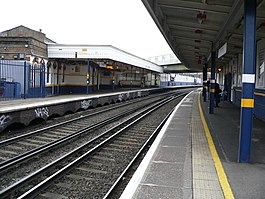Brixton railway station
| Brixton |
|
|---|---|
 |
|
|
Location of Brixton in Greater London
|
|
| Location | Brixton |
| Local authority | London Borough of Lambeth |
| Managed by | Southeastern |
| Station code | BRX |
| DfT category | E |
| Number of platforms | 2 |
| Fare zone | 2 |
| OSI |
Brixton |
| National Rail annual entry and exit | |
| 2011–12 |
|
| 2012–13 |
|
| 2013–14 |
|
| 2014–15 |
|
| 2015–16 |
|
| Railway companies | |
| Original company | London, Chatham and Dover Railway |
| Other information | |
| Lists of stations | |
| External links | |
| WGS84 | 51°27′46″N 0°06′48″W / 51.4629°N 0.1132°WCoordinates: 51°27′46″N 0°06′48″W / 51.4629°N 0.1132°W |
|
|
|
Brixton railway station is a commuter railway station in Brixton, South London, UK. It is on the Chatham Main Line from London Victoria to Orpington and beyond. Trains are operated by Southeastern. The typical service is one train every 15 minutes in both directions.
It is about 110 yards (100 m) north of Brixton tube station, high above ground level on a railway bridge that can be seen from the tube station. Access is from Atlantic Road via staircases. It is also a busy junction, with the Catford Loop via Peckham Rye and Bellingham leaving the Chatham Main Line immediately west of the station.
Brixton was opened as Brixton and South Stockwell in 1862 by the London, Chatham and Dover Railway (LC&DR) to serve the affluent Victorian suburbs of South London. Services ran from Moorgate to London Victoria via Holborn Viaduct railway station, Camberwell New Road and Brixton and South Stockwell to Grosvenor Road, following the opening of the link northeastwards to London Blackfriars via Loughborough Junction in 1864. The station was also connected to the LC&DR's branch to Crystal Palace High Level via Nunhead soon afterwards, with this section (via Denmark Hill) becoming part of the modern-day Catford Loop Line.
...
Wikipedia

